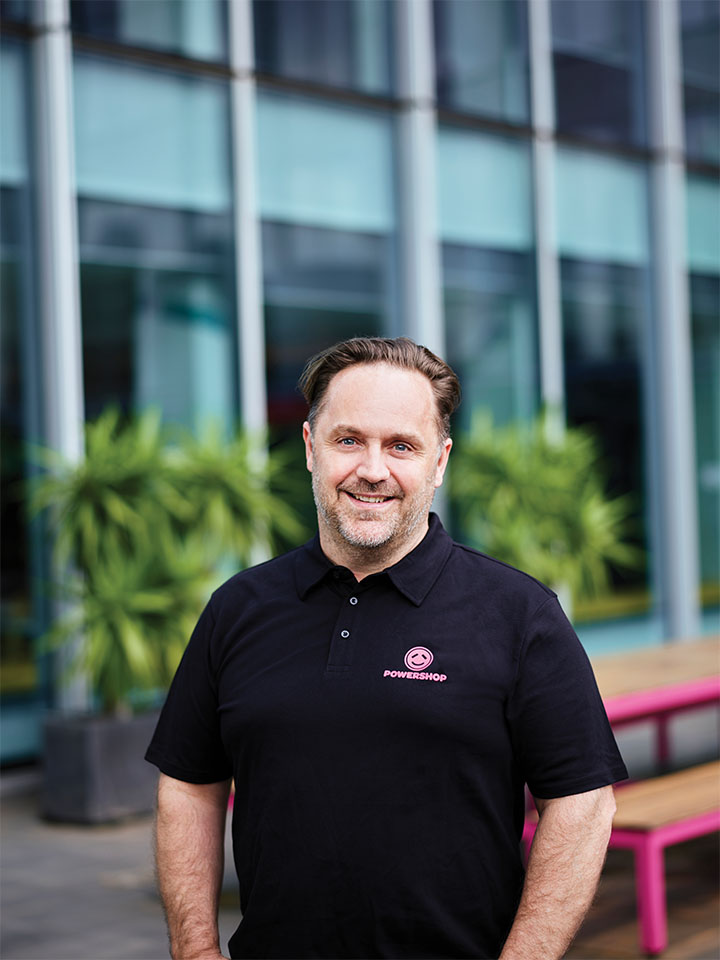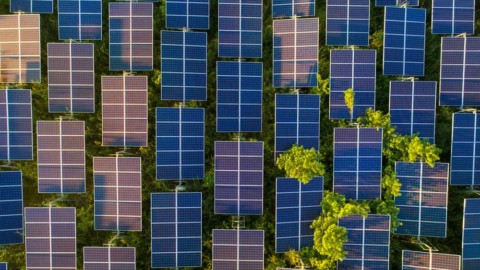by Kim Ho, journalist, Energy magazine
Mere months after his appointment as the new CEO of Powershop and Meridian Energy Australia, Jason Stein was faced with a baptism of fire: a devastating global pandemic. Energy magazine spoke to Jason about Powershop’s strategies to support customers through COVID-19, his vision for the company, and how to find opportunities amidst disaster to create a sustainable future for Australia.
Since it was founded in 1998, Meridian Energy, along with its retail arm, Powershop, has grown to break ground in the Asia-Pacific region’s renewables space: Powershop is now Australasia’s largest 100 per cent renewable energy generator, Meridian Energy achieved the largest IPO in New Zealand, and the company is also the largest electricity generator in New Zealand.
Expanding its operations to Australia in 2003 and founding Meridian Energy Australia in 2007, the company has continued to drive the development and operation of an integrated energy business underpinned by renewable energy generation.
In November 2019, Jason Stein, a long-time employee of the company, was appointed as Chief Executive for Meridian Energy Australia and its subsidiary, Powershop Australia.
Taking over the role from Ed McManus, Jason has assumed leadership of both Powershop and Meridian’s Australian renewable generation business.
After working for Meridian for almost 12 years, Jason has developed a wealth of knowledge and experience across all aspects of the company. He previously held the position of General Manager of the Office of the Chief Executive, where he was General Counsel and Company Secretary, accountable for the Sustainability, Legal, Regulatory, Government Relations and Communications functions.
But when he relocated from Wellington to Melbourne to begin his new role as CEO of Meridian Energy Australia and Powershop Australia, Jason hardly expected he would soon be steering the company through a global pandemic.
With empathy, positivity and determination, Jason has swiftly adapted to changing conditions to enable Powershop to continue supporting its customers through unprecedented challenges.
Stepping up to lead the way on climate change
Jason is obviously extremely passionate about the prospect of delivering affordable renewable energy to customers.
When asked why he wanted to take on the Chief Executive role, Jason cited the importance of renewable energy uptake amidst the global climate crisis.
“The opportunity to lead this organisation at this particular stage of the climate change conversation was a huge reason for me to take the job,” Jason said.
In May, the Australian Energy Market Operator released its Renewable Integration Study, suggesting that wind and solar resources could, at certain times, provide as much as 75 per cent of Australia’s energy by 2025.
The study shows that while there are technical challenges to maintaining system security as Australia increases its reliance on renewables, it already has the capabilities to meet those challenges.
For Jason, Powershop’s role is to provide a clean option for the increasing number of energy customers who value long-term ecological sustainability.
“We are really focused on helping Australia move to renewable generation, and giving customers a choice to choose an energy provider that puts the environment at the heart of what it does and is doing good things,” he said.
“Fundamentally, I actually do believe that Australia needs more renewables in our generation, and we are committed to continuing to invest in that. And the continued investment over time will help decrease energy costs for Australian households.”
Jason said he wanted Powershop to lead by example, making positive change both internally and externally.
“We do strive to do the right thing for our customers and for our employees, and for our stakeholders as well, regardless of what the industry as a whole is doing.”
What Australians are looking for in a power provider
At such a unique time in history, the energy sector is not only highly competitive, but also rapidly evolving. Power providers must recognise that customers’ needs and preferences are changing with the times.
For Jason, Powershop’s strategy shows that when a provider articulates a compelling reason for customers to join up, it becomes a self-fulfilling prophecy.
“Australians are looking for energy providers that support the values that they support, so Powershop is focused on giving Australians the choice of an energy provider that aligns with them,” he said.
“We’re focused on ensuring that customers know we’re doing the right thing for them and the environment, and ultimately, the more customers we get, the more we can invest in renewables. And that’s what we’ll continue to do.”
For Jason, it is inevitable that more people will start choosing their power providers with sustainability in mind, and that customers will start to lead the way towards greater renewable uptake in Australia.
Seeing the impacts that carbon emissions are starting to have, and the response we’ve had after the summer bushfires – it will cause more people to think about where their energy comes from.
Compassionate, customer-centred support during COVID-19
Tragically, Australia’s devastating bushfires have not been the only disaster to severely impact the energy sector this year. The COVID-19 pandemic has presented unprecedented challenges with global ramifications.
Right now, however, the immediate priority for Jason is for the sector to band together to mitigate the impacts of the pandemic, built around an empathetic, customer-centred approach.
To achieve this, Powershop is supporting its customers and continuing to work on its customer support programs and initiatives. The company is regularly reviewing these initiatives to ensure that they are appropriate and actually meaningful for the people who need them.
“I’ve been pretty impressed by the really positive way that all in the industry have been dealing with COVID – and in particular the customer focus at this time,” Jason said.
“Many of our customers are facing great pressure and anxiety at this time. From my perspective, it’s wonderful to see the industry being human with customers and showing compassion.
“We’re trying to help those people with things like payment plans; but over and above that, when I think about the people in our team assisting these customers, it’s about showing them empathy and kindness above all else.”
Energy sector collaboration crucial for customers
Beyond the tragic deaths of over 200,000 people worldwide, the COVID-19 pandemic has also wrought havoc on the global economy. It’s been estimated that approximately eight per cent of Australians – or 1.6 million people – lost their incomes in the first week of lockdown.
For their part, energy retailers are working on numerous measures to assist customers experiencing financial hardship as a result of lockdown.
This has been assisted by new interim authorisation from the ACCC for the sector to cooperate on developing relief measures to residential and business customers.
“There has been distinct collaboration, and plenty of industry initiatives that are working well – and collaboration across all parts of the industry isn’t always easy,” Jason said.
Nevertheless, the challenges presented by COVID-19 are unprecedented.
“The reality is, our customers are going through a once in a lifetime problem. Our customers are very loyal to us, and we want to repay that loyalty by helping them in a meaningful way.”
In such extraordinary circumstances, Jason said energy retailers have a responsibility to support Australians through uncertainty.
“It’s also really important that we recognise our role, as a power provider, in helping the economy when we get through this, to allow smaller businesses in particular to get through to the other side of this crisis. Making sure that we have adaptable and flexible plans for those customers is really critical.”
Adapting fast, staying nimble: leadership during a crisis
The nation-wide lockdowns mandated by state and federal governments to combat the pandemic have, of course, required major changes for Powershop’s staff. The company’s customer support team, based in a small provincial town in New Zealand, have all transitioned from a call centre environment to working from home.
This transition was made easier by the fact that, well before the pandemic hit, Powershop had already been testing the possibility for its staff to work from home. Staff only need a work laptop, which allows the platform to seamlessly transition to any location.
“It was actually a part of our regular thinking about how we deal with crisis,” Jason explained.
“We have a good sized call centre, but we aren’t super large, which allows us to be agile and nimble. We still kind of have that startup mentality, and we actually managed to get everyone working seamlessly from home over a day or two.”
Jason gave a shout out to Powershop’s frontline staff, whose work he described as “brilliant”.
“It isn’t easy working from home when you’ve got children there, but these guys have been the unsung heroes, quietly and calmly getting on with keeping the business running smoothly.”
Leading the more than 90 staff of Powershop and Meridian Energy Australia through an unexpected global crisis is an extremely daunting prospect. But Jason said his familiarity with the business from almost 12 years’ service has made leadership during this time much easier.
“I know the business well, I’ve been around the Australian market for a number of years. And I’ve known the executive team for a number of years. So it’s been very seamless.”
Jason said the organisation’s emphasis on fostering a highly collaborative and connected culture also assisted in managing COVID.
“We’ve accelerated the use of our existing technology to keep the team connected and informed and engaged. We’ve actually maintained all of our regular team routines and rituals, such as our usual, twice weekly all staff meeting.”
And that means the entire business – including workers at the top of wind turbines.
“We also do things like continuing our regular kitchen table trivia, it’s just all happening online now. In fact, this week, I had my first ever experience of a virtual lunch to farewell a really long standing employee.”
Jason said he and his team are tuned in to those possible impacts of the pandemic on culture and wellbeing, particularly as a result of working remotely. Management regularly checks in on staff and is providing strategies and initiatives to support the team as well as the business.
“For me personally, I want to keep in touch with most people, either directly or indirectly. So I’ve seen or heard from almost everyone in our business since lockdown,” Jason said.
“I guess in a personal way, it’s my real firm view that as an organisation, in the long run we’ll actually be judged by how we demonstrated empathy, positivity and put our staff and customers first.
“As a leader, I still really believe that call to action is right. It’s important to demonstrate kindness and respect, but with a real focus on the positive opportunities that arise.”
Positive thinking: creating opportunities amidst disaster
The devastating impacts of Coronavirus have disrupted 2020 plans and sparked widespread debate about the ‘new normal’ – and what the sector will look like in a post-COVID world. Jason believes part of this process of readjustment and recovery will necessarily involve deeper thinking about the environment and people’s impact upon it.
For Jason, the key to making the most of any crisis situation is focusing on the positives.
“We do believe that as a result of this unexpected event, opportunities will arise,” he said.
In order to take advantage of these opportunities, Powershop is continuing to develop its pipeline of renewable energy projects in Australia, so it can increase the size of its generation – either through its own development opportunities or through acquisition.
“We announced a few months back that we would purchase a development opportunity in New South Wales, and we continue to look at others that are at various stages. We have a very active development team who are looking to shift the dial there – we’re not sitting back and waiting for things to happen,” Jason said.
“What hasn’t changed is our commitment to build a sustainable energy future for Australia. So we’re still focused on growth, and ultimately, our focus remains on making a real difference for Australia by investing in renewable generation, and giving customers the choice to buy from a company they can be proud of.”


















